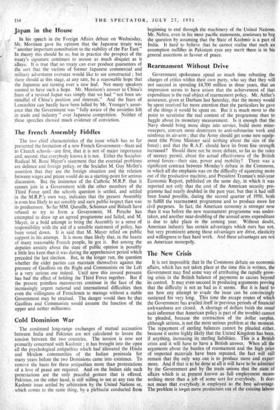Rearmament Without Drive
Government spokesmen spend so much time rebutting the charges of critics within their own party, who say that they will not succeed in spending £4,700 million in three years, that an impression seems to have arisen that the achievement of that expenditure is the real object of rearmament policy. Mr. Attlee's assurance, given at Durham last Saturday, that the money would be spent received far more attention than the particulars he gave of the things it would be spent on. But it is much more to the point to scrutinise the real content of the programme than to haggle about its monetary measurement. Is it enough that the Navy should bring more ships into service, build more mine- sweepers, convert more destroyers to anti-submarine work and reinforce its air-arm ; that the Army should get some new equip- ment (the Prime Minister said nothing about the size of the force) ; and that the R.A.F. should have its front line strength increased? Should there not be more debate, so far as the rules of secrecy permit, about the actual effectiveness of the British armed forces—their size, power and mobility? There was a significant contrast between Monday's debate in the Commons, in which all the emphasis was on the difficulty of squeezing moie out of the productive machine, and President Truman's mid-year Economic Report, published on the same day, in which it was reported not only that the_ cost of the American security pro- gramme had nearly doubled in the past year, but that it had still been found possible, during the second quarter of 1950, both to fulfill the rearmament programme and to produce more for civil purposes. In fact, the American economy is stronger now than it was before the new rearmament programme was under- taken, and another near-doubling of the annual arms expenditure is due to .take place in the coming year. • Without doubt, American industry, has certain advantages which ours has no but very prominent among those advantages are drive, elasticity and willingness to face bard work. And these advantages are not an American monopoly.


































 Previous page
Previous page